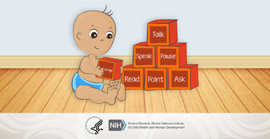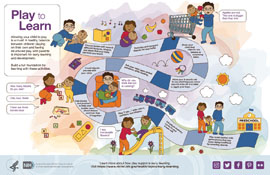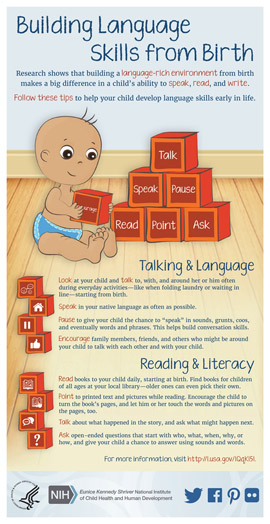Learning Starts Long Before Children Start Going to School

What children learn in their first few years of life–and how they learn–can affect their health and success as they grow into adulthood. NICHD-funded studies show that supporting early learning can lead to better grades in reading and math and higher test scores throughout the school years.
Play to Learn
 Luckily, one of the best ways to build early learning skills is by letting kids be kids through play. Playing stimulates all kinds of learning: muscle learning from reaching for an object, sensory learning from touching or tasting objects, memory and social learning from playing peek-a-boo, and language learning from hearing conversations and laughter. A healthy balance between structured learning with caregivers and letting them play on their own can build a strong foundation.
Luckily, one of the best ways to build early learning skills is by letting kids be kids through play. Playing stimulates all kinds of learning: muscle learning from reaching for an object, sensory learning from touching or tasting objects, memory and social learning from playing peek-a-boo, and language learning from hearing conversations and laughter. A healthy balance between structured learning with caregivers and letting them play on their own can build a strong foundation.
This infographic describes some activities parents and caregivers can do with babies and children to help them play to learn. Try some of them with your child.
Children's First Teachers
Parents, siblings, caregivers, and other family members can serve as teachers helping to shape baby's development.
Engaging with babies boosts their brain development, improves their language skills, and helps them learn social and behavioral cues. Research shows that:
- By 3 months of age, babies can recognize people they know.
- By 8 to 12 months, babies can recognize themselves in the mirror.
- From 18 months to preschool age, children can learn 9 new words each day.
As they grow, babies and children naturally pick up basic skills and concepts. But you can help.
For example, you can improve their pre-reading skills by letting them touch or hold a book during reading time and pointing to things on the page as you read. Reading with your child from a young age also helps spot reading problems early. Watch this video for other ways to help improve reading and pre-reading skills.
Developing Lifelong Learners: Reading Skills (06/30/2016)
The Importance of Baby Talk
Did you know that, at birth, babies can tell the difference between their mother's voice and other sounds from the world around them? They really are absorbing everything around them, even from their earliest moments.
 You can help them learn about language and behavior right from birth. Smiling at them shows them that you recognize or see them. Babbling with your baby, responding to their sounds with coos and noises, demonstrates that you hear them and helps them move from babbling to speaking more quickly. Also, talking to babies with words, and pausing to let them "answer," helps them learn the flow of conversations.
You can help them learn about language and behavior right from birth. Smiling at them shows them that you recognize or see them. Babbling with your baby, responding to their sounds with coos and noises, demonstrates that you hear them and helps them move from babbling to speaking more quickly. Also, talking to babies with words, and pausing to let them "answer," helps them learn the flow of conversations.
This infographic describes other ways to improve language learning in young children.
Counting on Success
Daily activities offer many chances for your child to learn. For example, you can help build your child's counting and math skills during a trip to the store. You can also instill concepts such as larger and smaller, heavier and lighter, higher and lower, and less and more during the outing. Watch this video for ideas about other ways to help your early learner.
Developing Lifelong Learners: Math Skills (06/30/2016)
Finding Answers
Understanding the "when," "how," and "why" of learning helps parents engage their children. This concept is a primary focus of the NICHD's Child Development and Behavior Branch. The branch examines brain development, learning and learning disabilities, language and math skills and disorders, and school readiness, among other areas.
Branch research has helped advance our knowledge about early learning and ways to improve early learning in various situations. For instance, their research found that:
- A simple feedback program, called the Video Interaction Project, helps low-income mothers interact more effectively with their infants and toddlers.
- Infants exposed to more than one language are better able to see a situation from another point of view. Similarly, children exposed to more than one language at home are better at focusing and filtering out unnecessary information.
- Children of parents who participate in a specific summer program have much higher retention of literacy and learning skills taught in Head Start, and they continue to do well during the subsequent school years.
- Early learning programs can have lasting positive effects, while poor language skills in early childhood may correlate with certain behavior problems.

 Text Alternative
Text Alternative  BACK TO TOP
BACK TO TOP